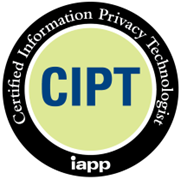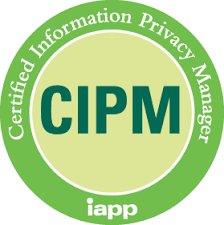CIPT vs. CIPM
In the current digital era, an ample amount of data is being transferred rapidly. Our digital information is being collected and stored by IT products and services. Now, the question of doubt is raised on how organizations use and manage data. The question of privacy has become a significant concern for the organization in ensuring data protection.

Organizations around the globe are actively recruiting privacy professionals to maintain data privacy for their products and services. To meet the skill gap in the data privacy field, IAPP has designed the three core certifications – CIPP, CIPM, and CIPT, which ANSI is accredited under ISO 17024. This blog is curated with a comparison of CIPT and CIPM certifications.
What is CIPT?

Certified Information Privacy Technologist (CIPT) is an internationally recognized certification from IAPP. It validates your skills in data privacy and practices from the technology perspective. The CIPT certification is mainly designed to indulge data privacy skills for IT and technical professionals. It helps you better understand how to work on privacy practices in the development stage of an application or service.
What is CIPM?

Certified Information Privacy Manager (CIPM) is a well-recognized certification designed by IAPP. It validates the skills required to build, implement, and manage data privacy and protection programs and practices in the organization’s operational lifecycle. It helps you to work on data privacy regulations by understanding how to implement regulations in day-to-day operations.
Objectives of CIPT and CIPM
CIPT Learning Objectives:
The CIPT certification helps you to achieve a better understanding of the following topics:
- How to build and equip privacy and protection practices on IT services, processes, and products
- How to protect data from different interference
- How to build privacy practices for data security and control, such as data encryption and limited access to data
- How to design and develop systems and software by ensuring privacy
- How to recognize challenges and benefits of technologies and how to use them by respecting the privacy
- How to perform audit infrastructure and spread awareness of privacy issues
CIPM Learning Objectives:
The CIPM certification course covers the following topics:
- How to create a company vision
- How to structure the privacy team
- How to build and implement a privacy program framework
- How to communicate to stakeholders
- How to measure performance
- The privacy program’s operational life cycle
Exam Details of CIPT and CIPM
| Exam Name | CIPT | CIPM |
| Exam Format | Multiple-choice and scenario-based questions | Multiple-choice and scenario-based questions |
| Exam Duration | 150 minutes | 150 minutes |
| Number of Questions | 90 Questions | 90 Questions |
| Passing Score | 300 out of 500 | 300 out of 500 |
| Exam Language | English | English, Brazilian, French, Portuguese, and German |
| Scope | Technology and data privacy | Privacy program management |
Career Scope of CIPT and CIPM
Career scope in CIPT:
CIPT certification validates your skills in implementing data privacy policies, strategies, processes, and techniques to achieve privacy goals. After completing the CIPT certification, you will be able to choose your career from the following job roles:
- Data Protection Officer
- Privacy Specialist
- Privacy Analyst
- Data Privacy Engineer
- Program Manager
- Risk and Privacy Officer
Career scope in CIPM:
CIPM certification validates the skills required to design, implement, and manage data privacy policies in the organization. After achieving the CIPM certification, you will be able to choose your career from various job roles:
- Data Protection Officer
- Privacy Analyst
- Risk and Privacy Officer
- Privacy Solution Sales Manager
- Program Manager
- Data Privacy Manager
- Data Governance Manager
CIPT vs. CIPM: Which one to Choose?
CIPT and CIPM are globally recognized and recommended certifications for those who want to build their career in data privacy and data protection. CIPT is designed for technologists to understand the importance of privacy considerations. In contrast, CIPM is intended for privacy practitioners to implement privacy programs and practices in the operation life cycle. CIPT provides skills in terms of the technical aspect of implementing privacy on IT services and products, whereas CIPM provides the operational aspect of how to develop a privacy program in the organization.
CIPT validates your knowledge of privacy and technology worldwide, whereas CIPM validates the skills required to manage and maintain privacy programs at all lifecycle stages.
If you are working in IT, engineering, data management, and security fields and want to land in data privacy, CIPT is the best option for you. If you want to work and implement privacy programs in the organization practically, then opt for CIPM certification.
Which Certification to Start with?
If your goal is to become a Data Privacy Officer (DPO), starting with the CIPM certification before the CIPT certification is advisable. The CIPM certification focuses on privacy program management, privacy governance, and the development of privacy policies and procedures. It builds upon the knowledge gained from the CIPP/E certification and equips professionals with the skills needed to manage privacy programs within organizations effectively.
Once you have obtained the CIPM certification, you can then proceed to the CIPT certification. CIPT specializes in privacy technologies and operational aspects, covering privacy-enhancing technologies, data lifecycle management, and privacy program implementation.
This sequence ensures a progression from foundational knowledge to program management expertise and then to privacy technology and operations, making you well-rounded and prepared to excel in various privacy-related roles within the IAPP field.
Advantages of Achieving Both the Certification
Completing both certifications will provide you with a comprehensive skill set that covers both the technological and managerial aspects of data privacy. This combination of knowledge and expertise makes you well-prepared for the responsibilities of a Data Protection Officer (DPO), as they can effectively manage privacy programs, navigate privacy technologies, and ensure compliance with privacy regulations.
While it is not mandatory to have both certifications to become a Data Protection Officer, obtaining both the CIPT and CIPM certifications is highly recommended by IAPP to enhance a candidate’s readiness for a DPO role.
Become CIPT or CIPM Certified with InfosecTrain
InfosecTrain is one of the best comprehensive training and consulting platforms from which many professionals have benefited across the world. It offers instructor-led certification training programs for both CIPT and CIPM by providing a complete understanding of data privacy and protection frameworks. If you want to enhance your career in the field of data privacy, then check out and enroll now.
TRAINING CALENDAR of Upcoming Batches For CIPT
| Start Date | End Date | Start - End Time | Batch Type | Training Mode | Batch Status | |
|---|---|---|---|---|---|---|
| 07-Jun-2025 | 22-Jun-2025 | 09:00 - 13:00 IST | Weekend | Online | [ Open ] |







 1800-843-7890 (India)
1800-843-7890 (India)